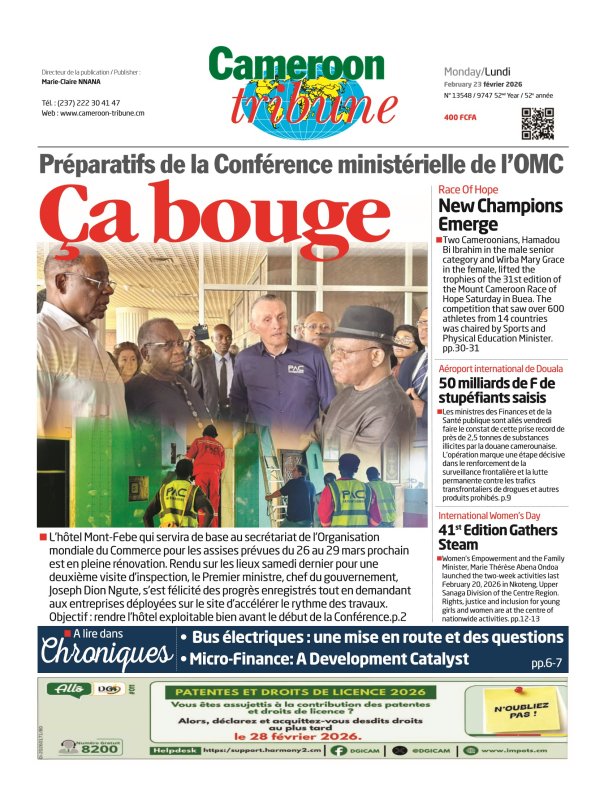In the early 2000, an unprecedented economic hardship swam ashore in Cameroon with attendant unemployment and generalised poverty. To crush the ugly head of the adversity, the powers that be opened the floodgate for commercial motorbikes with a Prime Ministerial decree of 2008. The decree number 2008/344/PM of 31 December, 2008 was a goodwill legal instrument to allow bike riders fend a living with their two-wheel vehicles by transporting passengers.
The Prime Ministerial instrument clearly spelt out operational modalities for commercial motorbikes. In the first place, that mode of transportation was to thrive solely in peripheral or semi-urban and rural areas of the territory. Mandatory documents ascribed for commercial bikes included for owners to acquire transporter license, register their motorbikes, paint the bikes yellow, equip each bike with two crash helmets, and get riders to obtain the category “A” driving license.
It was a sure way to wither unemployment, keep the youth busy and avoid them being the devil’s workshop. The various local council areas of the country were to relay the inscribed measures and enable riders to organise themselves into unions for identification and control. In some localities, riders had their uniforms and their union badges were publicly identifiable.
With motorbikes, many families could eke a living from the proceeds of picking and dropping passengers. Commuters gained in cost, time and availability of transportation means. Travelers could easily get to their far-flung destinations on bikes that would wriggle out their way even in traffic grid and along the worst roads. Young and energetic riders could shun crime by occupying themselves with bikes. They found bliss riding the machine even for the sake of it. Advantages of commercial bikes were legion including abated crime wave by turning the youth away from idleness.
Unfortunately, today, things have turned upside down. The goodwill by authorities allowing commercial motorbikes has turned into chaos. Especially that the guiding rules are not respected. Everyone does as it pleases. It is an uphill task these days to decipher between a genuine commercial motorbike transporter and the gangster infiltrating the ranks. The question now is, must it continue that way? Should the anarchy and danger be allowed to persist with motorbikes on the roads?
In all circumstances, the example of Buea City can be copied by other Councils. The then Mayor of Buea, Charles Mbella Moki, now Senator, succeeded to nib the anarchy in the bud. In rare foresight, he refused to allow motorbikes to ply the city’s main streets. He pushed commercial biking to the peripheral parts of the city and listed the reasons to include the fact of accidents on Buea’s hilly topography, crime with bikes and traffic disorder if bikes could be allowed on the major road. It was like bad news then. But time has come to prove such an epoch-making decision as very right. The phenomenon would have added salt to injury with the traffic grid surfacing in the South West capital city these days.
Commercial motorbikes have become a public nuisance in major cities of the country. Many cities and towns of Cameroon are in dire mess with commercial motorbikes causing accidents, engineering traffic jam, organising crimes as pick-pocketing, public aggression and kidnappings. The situation is so bad now and many pundits are thinking it should have been stiffly checked or not allowed from the beginning.
The recent accident at the eastern entrance to Douala widely reported last week in the media is a glaring epitome of hundreds of other bike-related mishaps that occur on the roads and streets daily. Motorbike taxis pose challenges to public order and safety in many situations. They engage in reckless driving with over speeding, weaving in and out of traffic, running red lights, and driving on sidewalks of the streets. These actions not only endanger the riders themselves but also their passengers and other road users.
Motorbike taxis, especially when operating in large numbers, add to noise pollution in urban areas. Their constant r...
Cet article complet est réservé aux abonnés
Déjà abonné ? Identifiez-vous >
Accédez en illimité à Cameroon Tribune Digital à partir de 26250 FCFA
Je M'abonne1 minute suffit pour vous abonner à Cameroon Tribune Digital !
- Votre numéro spécial cameroon-tribune en version numérique
- Des encarts
- Des appels d'offres exclusives
- D'avant-première (accès 24h avant la publication)
- Des éditions consultables sur tous supports (smartphone, tablettes, PC)











Commentaires